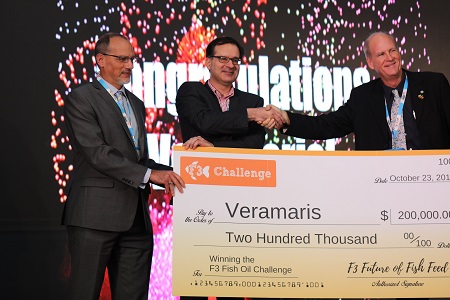
News
Showcase
Sustainability
Veramaris bags $200,000 prize for fish-free sustainable feed
October 24, 2019 By Nestor Arellano
 Michael Tlusty, F3-Judge and Associate Professor at the University of Massachusetts (left), Karim Kurmaly CEO Veramaris (center), and Kevin Fitzsimmons, Chair and Judge of the F3 Fish Oil Challenge (right). @ F3 Future of Fish Feed (PRNewsfoto/Veramaris V.O.F.)
Michael Tlusty, F3-Judge and Associate Professor at the University of Massachusetts (left), Karim Kurmaly CEO Veramaris (center), and Kevin Fitzsimmons, Chair and Judge of the F3 Fish Oil Challenge (right). @ F3 Future of Fish Feed (PRNewsfoto/Veramaris V.O.F.) Two billion. That’s the estimated number of fish saved through the sale of Veramaris’ fish-free fish feed. And $200,000 is the prize money the company won in the recent “F3 Fish Oil Challenge.” The competition was organized by global non-government organizations and researchers seeking to hasten the adoption of alternative feed ingredients in order to cut the feed industry’s reliance on wild-caught fish.
Veramaris, which produces fish-free EPA & DHA omega-3 oils used by commercial salmon, shrimp and bream farms, won the prize by selling the largest amount of its innovative and breakthrough feed. The company’s win was attributed to the readiness of Norwegian salmon farmers to adopt the company’s natural marine algal oil.
Nearly 90 per cent of the total two billion fish that were conserved during the challenge, according to estimates by the F3 Challenge organization: f3challenge.org/
Veramaris, is joint venture between DSM and Evonik. It excels at providing the aquaculture industry a high-quality source of EPA, DHA, and ARA. A recent study by the Norwegian research institution Nofima proved that high levels of omega-3 EPA and DHA in salmon diets resulted in significantly improved fish survival, growth, coloration, and welfare.
Aquaculture provides around half of the world’s seafood and is growing fast to feed a growing population. The industry relies on wild-caught fish for feed. The practice of using fish-based feed is putting the global fish stocks under increasing pressure.
According to the UN’s Food and Agriculture Organization (FAO), 90 per cent of fish stocks are either overfished or fished to their limit. A further reduction in these fish stocks would have a detrimental impact on the world’s marine ecosystems.
“The forecasted rapid growth of seafood consumption and the current reliance on using wild-caught fish means that if this trend continues, we may jeopardize marine eco-systems, while not being able to provide healthy and nutritious seafood to a growing population,” said Karim Kurmaly, CEO of Veramaris. “Farmed seafood, by far the most sustainable source of animal proteins, is critical for transitioning to sustainable and future-proof food systems”.
The Future of Fish Feed was launched in 2015 as a collaborative effort by NGOs, researchers, and private partnerships to accelerate the commercialization of aquaculture innovations to alleviate pressure on the oceans. The F3 Challenge is sponsored by The University of Arizona, University of Massachusetts Boston, Cuna del Mar, Synbiobeta, Anthropocene Institute, Dawson Family Fund, Sustainable Ocean Alliance, The Nature Conservancy, The Campbell Foundation, Tides Foundation, and The National Renderers Association.
.
Print this page